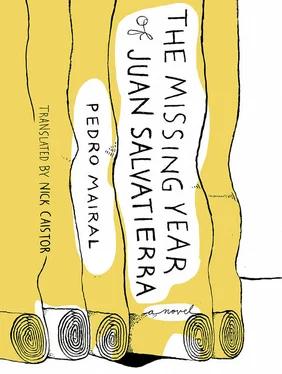“Yes… it’s a statue or something, isn’t it?”
“A painting.”
“The fat guy mentioned something about it.”
The “fat guy” must have been the Cultural Affairs secretary. When I said nothing, Baldoni looked down and muttered:
“I’ll give you ten thousand pesos for the plot.”
That wasn’t too bad an offer. Baldoni glanced back at me.
“Well,” I said, “as you know, I run a real estate office in Buenos Aires… and your offer…”
“In Buenos Aires?”
“Yes…”
“There’s no way you can compare prices in the capital with those out here.”
“No, but…” I let my voice trail off. “Anyway, once the work is finished I guess we’ll take all the stuff out of there, so then we can sell it.”
“And how long will that take?”
“Oh… quite a long while.”
Baldoni smiled, somewhat irritated. We said goodbye, and I left with the bottle hanging in a plastic bag from my handlebars.
Jordán was outside his house, leaning on the fence. He was wearing glasses, and his hair was neatly combed. The dogs didn’t bark.
“Good morning,” I said, making sure the shotgun was nowhere to be seen.
“Morning,” he said, staring without recognizing me.
“I’m Miguel Salvatierra. Miguel,” I explained, “Juan Salvatierra’s son.”
“Ah, how’s it going, che ?” he said, extending his hand over the fence.
“I’ve brought you a little bottle of what my father owed you.”
I held the whiskey out to him, and he took it, astonished.
“But I haven’t drunk in years. Thanks a lot, but take it with you. If my granddaughter catches me, there’ll be hell to pay.”
I stood there, bottle in hand, not knowing what to say. He seemed to have his wits about him today.
“Jordán, do you remember Salvatierra’s painting?”
“Yes, that long thing he was always doing on rolls of canvas?”
“Yes. You know one of them is missing.”
“It must be Ibáñez who has it.”
“Fermín Ibáñez? The black guy?”
“That’s right, the black guy. I’ve no idea if he’s still alive. He must be getting on a bit now.”
“Where can I find him?”
“He always used to stay down by the river. Down by the pétanque court. He sometimes went down there when it was closed. They say he would go around shouting out loud, muttering bets into thin air, talking to himself.”
“He made bets even though no one was around?”
“Nobody! You know there’s no shortage of crazy old men around here.”
“So you think Ibáñez has got the painting?”
“He was the one who stole it from him,” Jordán said with a laugh. “He wanted to burn it. I told him it’d be better to sell it: What good would burning the painting do? Sell it, make some dough! But Ibáñez was always a bit dumb.”
“Why did he steal it?”
“Who knows? Kids’ stuff.’”
“Kids? They were over fifty when it happened.”
“They were? They must have been drunk then. Ibáñez was always drunk.”
“How many years ago can that have been?”
“How should I know? A ton of years. We didn’t see Salvatierra anymore. We crossed over to Uruguay because the military were after us on this side. They wanted to get rid of us fishermen. They said we were vagrants.”
We both fell silent. The dogs had dozed off at his feet.
“What year did your dad die in?” asked Jordán.
“In 1990.”
“How old was he?”
“Eighty-one.”
“Imagine that. We first met as youngsters.”
“And when Salvatierra worked with you, what kind of work was that?”
“Odd jobs.”
“Odd jobs?”
“Yes,” he said, and this time he didn’t laugh. “I had a big boat and we transported limestone from Berti’s quarry, or hides from Peluffo’s tannery, or wool. Anything we could get our hands on.”
“Is that right?”
“Yes… Would you like to come in for some mate tea?”
“No thanks, boss, I have to be off.”
We said goodbye.
I pedaled towards the river down dirt roads, between ditches and rows of low houses, steering around potholes with the bottle hanging from the handlebar and clanking against the bike frame. This part of town was neglected, run down, with no sign of any new housing. Nobody went by: dogs were curled up asleep in the middle of the road. I cut through Parque Ortiz, where we once played football. The weeping willow Salvatierra used to sit under when he came to watch us was still there. The paths and flowerbeds had long since gone, the grass was uncut; it looked like wasteland. A chestnut foal was rubbing its neck on one of the goal posts.
The Dutchman and Aldo had scanned almost half the canvas. Boris explained that he had emailed some of the digital images back to the museum. There was good news: the museum had decided to purchase the entire work. Contrary to what I’d expected, the news made me feel very sad. The painting would no longer be ours. We had to start getting together the paperwork so that it could leave Argentina. Until all that was complete, Boris was to carry on with the digitalization. Even though this could be done in Holland once the work was there, Boris had been told to continue for now. They wanted to copy as much of it as possible before he returned, because they were going to present some Latin American artists in a biennial. There wasn’t much left to do. Working two five-hour shifts, Boris and Aldo dealt with two hundred and forty meters of the canvas each day; in other words, four rolls, more or less. We calculated it would take them just over a week to finish. But perhaps we could ship out the canvas before then.
I talked to Luis. We needed to find out about Customs duties, to see if they applied to works of art, perhaps ask for an export request. He said he’d take care of all that.
“Did you find the missing roll?” he asked.
“No,” I said, “but I know who has it.”
That afternoon I headed for the river, determined to find Ibáñez. I was going to have to ask for him by name, or for a black fisherman. I couldn’t recall his face; and anyway, he must be old by now, and too much changed for me to identify him. Jordán had said I should look for him down by the pétanque court, so that’s where I started my search. The houses here had watermarks from different floods, some of them halfway up their windows. I took a gravel path that led off to the north.
It was one of the first days of spring; not cold, but damp. Alongside the road stood the usual stalls, offering bait with signs saying “maggots, eels, earthworms,” and clear plastic bags full of water with tiny bream swimming in them.
Two boys in baseball caps rode past. One of them was carrying a cage on his handlebars with a cardinal inside. The other had a fishing rod and two fat fish hanging from the frame of his bike. I asked them if the fish were biting.
“Not a lot,” they replied warily.
“Have you come from Vélez beach?”
“No, from the quay.”
“Did you see any old fishermen down there?” I asked them, braking to catch my breath as they cycled off.
They slowed up and looked back over their shoulder at me.
“Any of those old guys who live on the riverbank,” I said. “Are there none down at the quay?”
“No, but there are people at Los Italianos.”
I thanked them, and they went on their way much more rapidly than me.
The rush of air from passing cars made my handlebars wobble. I saw there was a faucet in the entrance to a tire repair place, so I stopped for some water. The building was nothing more than a cement cube, with bushes and weeds immediately behind. A woman and two children were sitting on deck chairs, drinking mate in the doorway. I gestured towards them if I could use the tap, and they said yes. The kids were feeding bits of crackers to a young river otter. I wet my head, neck, and face. I saw some skins hanging from the wire fence, and thinking the otter hunter might be around, I went up to talk to the group.
Читать дальше












